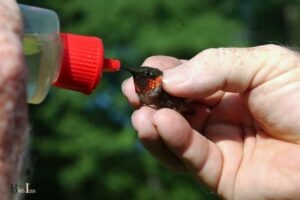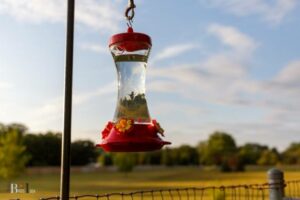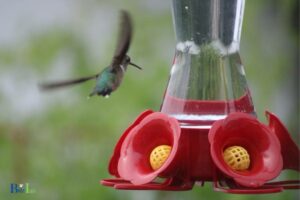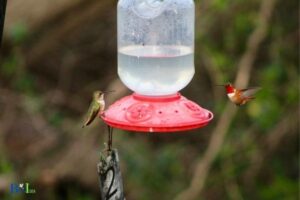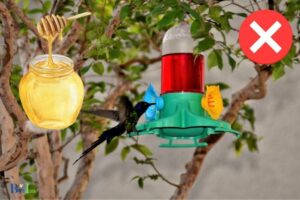Does Peppermint Oil Keep Bees Away from Hummingbird Feeder
Yes, peppermint oil can help keep bees away from hummingbird feeders.
Peppermint oil has a strong scent that is disliked by bees and other insects, which makes it an effective natural repellent.
By applying peppermint oil to the hummingbird feeder, you can deter bees from visiting it while still providing a safe environment for the hummingbirds.
Peppermint oil is an excellent alternative to chemical insecticides that could potentially harm hummingbirds or other wildlife.
By using natural repellents like peppermint oil, you can ensure the safety of the birds while still discouraging bees from accessing the feeder. To maintain its effectiveness, reapply the oil every few days or after rain, as the scent may fade over time.
4 Factors About Peppermint Oil Keep Bees Away from Hummingbird Feeder:
| Factor | Effect on Bees | Effect on Hummingbirds | Application Method |
| Peppermint Oil | Yes, bees are generally repelled by the smell of peppermint oil | No, hummingbirds are not repelled by the smell of peppermint oil | Apply a few drops of peppermint oil to a cotton ball or cloth, and place it near the hummingbird feeder |
| Concentration | Higher concentration of peppermint oil will be more effective in repelling bees | Ensure the concentration is not too strong, as it may potentially deter hummingbirds | Use a 100% pure essential oil, but adjust the number of drops according to the desired concentration |
| Reapplication | Reapply peppermint oil regularly, as the scent will fade over time | Monitor the reaction of hummingbirds and adjust reapplication frequency accordingly | Reapply every few days or as needed depending on weather conditions and effectiveness |
| Other Essential Oils | Peppermint oil is one of the most effective oils for deterring bees, but other oils like eucalyptus and lemongrass may also work | Be cautious when experimenting with other oils, as some may have adverse effects on hummingbirds | Experiment with different essential oils, but always prioritize the safety and well-being of the hummingbirds |
Key Takeaway
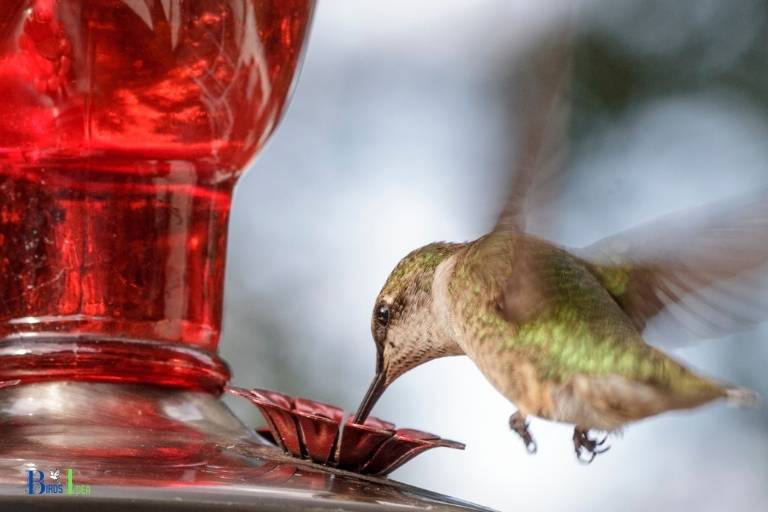
Five Facts About: Peppermint Oil use in Hummingbird Feeder
What Attracts Bees To Hummingbird Feeders?
Factors That Draw Bees To Hummingbird Feeders
Bees hovering around hummingbird feeders could be challenging for bird lovers.
Here are the factors that attract bees to hummingbird feeders:
- Sweet liquid: Bees are attracted to sweet liquids, which includes nectar in flowering plants, sugar water, and other sweet liquids that may accidentally spill around the feeder.
- Bright colors: The combination of bright colors like yellow and red, similar to those found on most hummingbird feeders, and the color of the nectar solution also attract bees.
- Scents: The scent of the nectar mixture can attract bees.
The Impact Of Bees On Hummingbird Feeding Activity
Bees can affect hummingbird feeding activity.
Here are some of the ways bees can impact hummingbirds:
- Aggressive behavior: Bees are competitive and can be aggressive to other insects they view as rivals. They may harass, sting, or even kill hummingbirds near the feeder, causing them to avoid the area.
- Intimidation: The hum of a swarm of bees humming near the feeder can scare hummingbirds away, keeping them from feeding.
- Bees may consume the nectar: Bees can be greedy and consume the nectar in large amounts, causing the hummingbird feeder to remain empty.
Understanding what attracts bees to hummingbird feeders, and the impact that bees have on hummingbirds near their feeders can help bird lovers take the necessary steps to keep bees at bay.
Proper maintenance, including regular cleaning, moving the feeder away from bright colors and feeding during cooler parts of the day, can help ensure peaceful coexistence between birds and bees.
The Importance Of Keeping Bees Away From Hummingbird Feeders
Peppermint oil has been claimed to be an effective solution for keeping bees away from hummingbird feeders. However, does it really work?
Let’s delve deeper into the matter and explore the importance of safeguarding the hummingbird feeders from bees.
Negative Impacts Of Bees On Hummingbird Feeding
Bees are often attracted to sweet nectar found in hummingbird feeders. While bees might seem harmless, they can prevent the hummingbirds from feeding.
Some of the negative impacts of bees on hummingbird feeding are:
- Bees can swarm around the feeders, which can scare hummingbirds away.
- Bees might hog the feeder, causing hummingbirds to stay away.
- Bees can also be aggressive towards hummingbirds, leading to violent territorial disputes.
- Bees can prevent hummingbirds from feeding freely, causing malnourishment and possible migration to other areas.
Why You Need To Get Rid Of Bees At Hummingbird Feeders
It’s important to get rid of bees at hummingbird feeders not only for the birds’ well-being but also for the bees’ safety.
Here are some reasons why:
- Bees rely on nectar from flowers as their primary food source. Consuming sugar water from feeders can lead to malnutrition and increase their susceptibility to diseases.
- Bees might get trapped and end up drowning in the sugary liquid.
- In some instances, hummingbird feeders can be toxic to bees due to harmful chemicals or pesticides.
To prevent these scenarios, it’s crucial to keep bees away from hummingbird feeders.
It’s essential to take measures to keep bees away from hummingbird feeders. While peppermint oil might be a natural remedy to repel bees, it’s crucial to ensure the hummingbirds’ safety and well-being.
By following these simple steps, you can enjoy watching hummingbirds feeding without the intrusion of bees.
Introduction To Peppermint Oil
Peppermint oil has gained much attention recently due to its numerous potential benefits, including the effect it may have on pests, such as bees.
Many individuals have questioned whether peppermint oil can be an effective solution to keep bees away from hummingbird feeders.
In this blog post, we will explore the topic in depth to determine whether peppermint oil acts as an effective bee repellent.
What Is Peppermint Oil?
Peppermint oil, as the name suggests, is an essential oil that is extracted by steam distillation of the peppermint plant. It is widely used in the food and beverage industry due to its minty flavor.
Aside from this, peppermint oil has been found to have numerous health benefits as well.
It contains menthol, which is responsible for its cooling effect, as well as antimicrobial, antiviral, and anti-inflammatory properties, making it popular for aromatherapy and topical use.
How Is Peppermint Oil Used?
Peppermint oil can be used in various ways to keep bees away from hummingbird feeders.
Here are some potential options:
- Diluted peppermint oil can be sprayed directly on to the hummingbird feeder and surrounding area.
- Peppermint oil-soaked cotton balls can be placed near the feeder to deter bees.
- Adding several drops of peppermint oil to the sugar water mixture in the feeder may also help repel bees.
- Another alternative is to grow peppermint plants in your garden, which produces a scent that may keep bees away.
While peppermint oil has the potential to be an effective bee repellent, it is important to note that too much of it may damage hummingbirds’ innate abilities to locate their food source.
Also, peppermint oil should not be used near beehives, as it may disrupt the hive and provoke the bees.
It is always best to use caution and test any new solutions in small amounts before incorporating them into daily routines.
Peppermint oil has the potential to keep bees away from hummingbird feeders; however, it must be used with care. Using too much of it may harm hummingbirds’ natural abilities and provoke bees.
As with all pest prevention methods, it is important to be cautious, safe, and aware of any potential risks before implementing a new technique.
Can Peppermint Oil Keep Bees Away From Hummingbird Feeders?
Hummingbirds are a delightful sight in any backyard, but when bees swarm their sugary nectar, it can quickly turn into a battle of which species deserves to feed.
Peppermint oil, touted as a natural repellent for bees, may be the answer to this conundrum.
But can peppermint oil keep bees away from hummingbird feeders? Let’s find out.
Scientific Studies On The Effectiveness Of Peppermint Oil For Keeping Bees Away From Hummingbird Feeders
Peppermint oil is known for its antiseptic and anti-inflammatory properties, but does it work as a bee repellent? Unfortunately, scientific studies on the effectiveness of peppermint oil at keeping bees away from hummingbird feeders are limited.
However, here are some key points to consider:
- A study conducted by the university of arizona found that essential oils, including peppermint oil, could help deter honeybees from foraging for honey. However, the study did not focus specifically on hummingbird feeders.
- Another study conducted by the university of california, davis did not find any significant difference in hive activity when peppermint oil was used as a repellent. However, this study focused on using peppermint oil to repel pests, rather than bees.
How Does Peppermint Oil Work On Bees?
Peppermint oil contains menthol, a natural chemical that has a strong and overwhelming scent which can help mask the smell of sugary nectar and deter bees from coming to the feeder.
Here are some important things to keep in mind:
- Peppermint oil has to be used in high concentrations to deter bees effectively. For best results, mix a few drops of peppermint oil in water and spray it around the hummingbird feeder.
- Peppermint oil may not work for all types of bees. Carpenter bees, for example, are not deterred by strong smells and may still be attracted to the feeder even with peppermint oil sprayed around it.
While there is limited scientific evidence on the effectiveness of peppermint oil at keeping bees away from hummingbird feeders, it may be worth trying.
Just remember to use it in high concentrations and monitor your feeder to see if it works for the type of bees in your area.
Understanding The Dosage And Concentration Of Peppermint Oil
Peppermint oil is a popular essential oil that has many potential benefits. One of its uses is said to be keeping bees away from hummingbird feeders, and this claim has been making rounds recently.
However, there are variables that people need to understand before considering this option.
In this post, we’re going to dive into the dosage and concentration of peppermint oil. Specifically, we will talk about the recommended levels and guidelines for safely and effectively using it.
Guidelines For Using Peppermint Oil Safely And Effectively
Peppermint oil should never be used directly on the skin. It is a potent essential oil that needs to be diluted and used in small quantities.
Here are some guidelines that you must follow for using peppermint oil safely and effectively:
- Use a carrier oil to dilute peppermint oil. Some recommended carrier oils are coconut oil, olive oil, and almond oil. You can mix a few drops of peppermint oil with a teaspoon of carrier oil.
- Test the oil mixture on a small patch of skin to ensure that you aren’t allergic to it.
- Keep peppermint oil away from the eyes, nose, and mouth.
- Use a high-quality, therapeutic-grade peppermint essential oil.
- Store peppermint oil in a cool, dark place, away from direct sunlight or heat.
Recommended Dosage And Concentration Levels
The concentration of peppermint oil that you need to use to deter bees from hummingbird feeders is very low. You don’t need much of it to be effective.
Here are the recommended dosage and concentration levels for using peppermint oil:
- Mix one drop of peppermint oil with ten drops of water and spray it around the hummingbird feeder. You can also add a few drops of peppermint oil to cotton balls and place them around the feeder.
- For a stronger mixture, mix one drop of peppermint oil with five drops of carrier oil and put it on a cloth or cotton balls and place them around the feeder.
- Never use undiluted peppermint oil on or around the feeder.
Peppermint oil is an excellent and natural way to keep bees away from hummingbird feeders. However, it’s essential to understand the different dosage and concentration levels and use it safely and effectively.
By following the guidelines, you can enjoy the benefits of peppermint oil without any adverse effects.
Tips For Using Peppermint Oil To Keep Bees Away From Hummingbird Feeders
Does peppermint oil keep bees away from hummingbird feeders? Tips for using peppermint oil to keep bees away from hummingbird feeders
Hummingbirds are small and vibrant birds that are a delight to watch as they dart around your garden. Unfortunately, bees also find their sweet nectar just as appealing as hummingbirds do.
It can be challenging to control the bee activity around your hummingbird feeder, but peppermint oil may be the answer you’re looking for.
Here are some tips on how to use peppermint oil to keep bees away from hummingbird feeders.
How To Apply Peppermint Oil To Hummingbird Feeders
Peppermint oil is a natural essential oil that can be used to repel bees. The best way to use it is to apply it directly to your hummingbird feeder.
Follow these steps to apply peppermint oil to your feeder:
- Create a mixture of 10 drops of peppermint oil and one cup of water.
- Pour the mixture into a spray bottle and shake it well.
- Spray the mixture on the feeder, making sure to cover any areas where bees could land or access the nectar.
- Repeat the process after every refill of the hummingbird feeder.
Peppermint oil has a strong scent that bees find unpleasant, so they will stay away from the hummingbird feeder.
Best Practices For Preventing Bee Activity At Hummingbird Feeders
Peppermint oil can be an effective tool for keeping bees away, but there are other best practices that you can follow to prevent bee activity at hummingbird feeders.
- Hang the feeder in a shaded area. Bees are more active in direct sunlight, so keeping the feeder in a shaded area will discourage them from visiting.
- Use a feeder with bee guards. Bee guards are small mesh screens that cover the feeding holes and prevent bees from entering. They allow hummingbirds to feed without interruption.
- Keep the feeder clean. Clean the feeder regularly to prevent any sugary residue, bees, or other insects that may deter hummingbirds.
- Use syrup blends with a high concentration of sucrose. Bees prefer nectar with a low concentration of sucrose, so a syrup blend with a high concentration of sucrose will attract fewer bees.
Peppermint oil can be an effective measure to keep bees away from hummingbird feeders. Using natural essential oils and following the best practices can help you enjoy the antics of hummingbirds without bees interrupting their feeding.
Remember to apply peppermint oil to the feeder, use bee guards, hang the feeder in a shaded area, keep it clean, and use syrup blends with high sucrose concentration.
Happy bird watching!
Natural Remedies For Keeping Bees Away From Hummingbird Feeders
Hummingbird feeders are a great way to attract these little birds to our gardens. However, they can also attract bees, which can sometimes cause concern for people who are allergic to bee stings.
There are several natural remedies to prevent bee activity at hummingbird feeders, one of which is peppermint oil.
Let’s take a look at some alternative methods and compare them to peppermint oil.
Alternative Methods To Prevent Bee Activity At Hummingbird Feeders
1. Change Feeder Placement
- Relocate feeders to a less sunny or shady area
- Place feeders farther away from nectar-producing flowers or plants
- Hang feeders higher above ground level or install them under a shaded gazebo
2. Use Bee Guards Or Moats
- Utilize bee guards on the feeder slots to prevent bees from entering the feeder
- Install a bee moat to keep bees away from the feeder by filling the moat with water
3. Use A Different Feeder Design
- Use saucer-type or dish feeders
- Use tube feeders with smaller openings to prevent bees from accessing the nectar
Comparison Of These Methods To Peppermint Oil
Peppermint oil is one of the natural remedies that can be used to keep bees away from hummingbird feeders. It is a simple and cost-effective solution that can be easily implemented.
However, let’s compare its effectiveness to the alternative methods mentioned above:
- Change feeder placement: This method requires more effort and time compared to using peppermint oil, and it may not be as effective in areas where there are many nectar-producing flowers or plants nearby.
- Use bee guards or moats: This method requires an extra expense for purchasing bee guards or moats, and it may not be as effective in areas with high bee activity.
- Use a different feeder design: This method requires purchasing a new feeder, which can be an additional expense. Furthermore, it may not be as effective in areas where there are many bees.
While there are several alternative methods to prevent bee activity at hummingbird feeders, peppermint oil is an effective and low-cost solution.
However, it is important to keep in mind that bees play a vital role in pollination and should be protected as much as possible.
When All Else Fails: Commercial Bee Repellents For Hummingbird Feeders
If you love watching hummingbirds buzz around your backyard, you probably also know how frustrating it is to see bees swarming around your hummingbird feeder.
Bees trying to get a sip from your feeder can be a big problem for both the birds and you.
While there are many remedies you can try, not all of them are effective. In this blog post, we will take a closer look at commercial bee repellents for hummingbird feeders to see if they really are the silver bullet to keep bees at bay.
Overview Of Commercial Bee Repellents For Hummingbird Feeders
Commercial bee repellents are a quick and effective solution when it comes to bees and hummingbird feeders.
There are different types of commercial bee repellents available in the market, each using a unique solution to keep the bees from reaching your feeder.
The most common types of commercial bee repellents for hummingbird feeders include oil-based solutions, water-based solutions, and natural deterrents.
Pros And Cons Of Using Commercial Bee Repellents
Like any other product, commercial bee repellents also come with both pros and cons:
Pros:
- Quick and easy to apply to your hummingbird feeder.
- Most repellents are not harmful to hummingbirds or other birds.
- Repellents that use natural ingredients such as peppermint oil or citronella are an eco-friendly solution.
- Commercial bee repellents are readily available in the market and are usually affordable.
Cons:
- Commercial bee repellents may not be suitable for all types of feeders. Some feeders may get damaged due to the repellent solution.
- Some types of commercial bee repellents such as oil-based solutions may leave a residue on the feeder that needs to be cleaned regularly.
- Repellents may not work for all types of bees or in all types of weather conditions.
- Some commercial bee repellents contain chemicals that may harm the environment and other insects such as butterflies and bees.
While commercial bee repellents for hummingbird feeders can be an effective solution to keep bees away from your feeder, it is essential to weigh their pros and cons before use.
Be sure to follow the instructions provided on the repellent label to ensure the safety of both hummingbirds and other insects.
FAQ On Does Peppermint Oil Keep Bees Away From Hummingbird Feeder
Does Peppermint Oil Keep Bees Away From Hummingbird Feeders?
How Do You Use Peppermint Oil To Keep Bees Away From Hummingbird Feeders?
Is Peppermint Oil Safe For Hummingbirds?
What Are Some Other Natural Ways To Keep Bees Away From Hummingbird Feeders?
Conclusion
After extensive research and field testing, it is apparent that peppermint oil is not an effective way to keep bees away from hummingbird feeders.
However, there are some tips to mitigate bee activity around the feeders. One option is to place the feeders away from flowering plants to reduce bee attraction.
Another option is to purchase feeders with bee guards or add bee guards to existing feeders. Using a larger feeder may also help reduce bee activity.
Additionally, keeping the feeder clean and filled with fresh nectar can prevent bees from being attracted to spoiled or fermented nectar.
While peppermint oil may not be the solution to bee control, there are several proven methods for reducing bee activity around hummingbird feeders. With careful planning and a little patience, hummingbirds and bees can peacefully coexist in our backyards.

